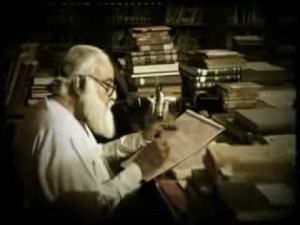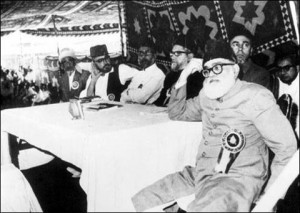Maududi said ‘NO’ to Pakistan. Why?
After 1937, Moulana Maududi’s literature started to turn its attention on political analysis; his writing mainly centred on theology thus far. In the election held in 1937, the Indian National Congress won with a whopping majority in the Hindu-majority provinces. Congress leaders thereafter exuded the mood of confidence that the new-found religious majoritarian power, in lieu of pluralism that had for centuries existed in India, could only give. Maududi was concerned about the absence of commonalities in the Congress that could bridge the gap between the Muslims and Hindus. Maududi’s analysis of the Congress policies attracted the attention of the Congress leaders. Maududi was of the opinion that, supporting the Congress would be suicidal to Muslims, as long as the party has moorings in a single nationalism. That actually helped the Muslim League, since several Muslims in the Congress migrated to the League as they understood that the formation of Pakistan would only be a way out of majoritarianism.
The argument appeared in Mawdudi’s three-volume book titled Musalman aur Maujooda Siyasi Kashmakash (Muslims and the present political tug of war; the book has not yet been translated into English). The articles collected in the book were widely circulated by League. But, Mawdudi never aimed at the formation of Pakistan. In the subsequent edition, Mawdudi registered his reservation against the Pakistan Movement, arguing that Pakistan trumpeted by the All India Muslim League would never bode well for Islam. While Muslim League made use of Maududi’s articles which scathingly attacked the Congress indifference to minorities, the Congress, too, spread his articles which posed arguments against the partition. This proves the differences of Mawdudi’s position on the issue from the one taken by both the League and the Congress. Mawdudi makes this difference amply clear in the third part of Siyasi Kashmakash.
In the article written by Dr Ishtiaq Hussain Qureshi, former vice chancellor of Karachi University, Maududi’s stance has been objectively analyzed. According to Qureshi, Mawdudi’s reservation against the League is mainly about its structure which leads to a mishmash of Communists, atheists, and Muslim nationalists. Maududi doubted that such a formation could play any constructive role in the revival of Islam. On being asked about co-operating with the League, Maududi retorted: ‘Please, don’t think about it. I can’t go to League owing to certain differences of opinion. If you mean co-operation, I don’t know on what terms I should co-operate. I am rarely won over by partial solutions. I have never been interested in tentative activities.’
Undoubtedly, Pakistan was only a partial solution. And that, according to Qureshi, spooked Maududi. Maududi thought that there would not be any basis for the security of Muslims who remain in India, nor would there be any progress for their religion should Pakistan come to exist. He was more concerned about the future of Indian Muslims. He never opted for a tentative solution for Muslims in India, rather than for a complete safety and security for Islam in the subcontinent. He did not consider independent Pakistan as part of his larger plan. He preferred a political system which would respect nationalities. He submitted the blueprint for a confederation consisting of autonomous religious groups. According to the proposal, each group would have complete control over its religious and educational affairs and social institutions, recognised as each group is as body with autonomous rights and power. The federal centre is so structured that each constituent in the confederation shares equal power. Each religious group has the power and right to observe and bring to effect the religious law.
An alternative to the confederation was the formation of culturally autonomous states. A cultural group will possess the right to live in a particular state it prefers in the span of 25 years. This would help the Muslims to locate the Islamic lifestyle and culture in a particular space. Maududi suggested a third alternative which was a confederation consisting of two federations-that of Muslim majority states and that of Hindu majority states. The confederation will have executive power over mutually relevant categories such as defence, transport and commerce.
According to Qureshi these alternatives are restricted to the constitutional safeguards. One of their drawbacks is that parties with more power and influence can easily violate the restrictions implicit in these systems. Under the proposed confederation, self-centred power institutions like armed force do exist. Maududi know that the safety and security of minority interests will be violated under the onslaught of a powerful majority. So, Qureshi is surprised to see that Maududi is hardly concerned about such an eventuality. Qureshi concludes that constitutional safeguards will fail in the face of a majority onslaught in the light of general historical experience of minorities.
Maududi has to face brickbats later in his life from his political opponents in Pakistan for the stance he as well as his party has taken against the formation of Pakistan. But he neither denied nor regretted stance. In the run up to the 1970 election, he justified it ever more courageously. He stated in a lecture delivered on the foundation day of Jamat-e-Islami on August 26, 1970: ‘People can say whatever they like regarding it (the party’s stance). I don’t bother it. I still believe that my duty is to convince Muslims that their aim is not to constitute a communal state.”
“In short I faced three issues: If the nation was not to be partitioned, what should be done for the safety and security of Muslims? If it was to be partitioned, what should be done for the Muslims who would remain in India? How to save Muslims from forming a non-Islamic government in countries that would come under their power?”
“In the fateful and calamitous situation of 1947, I travelled all across the country once again. I delivered speeches in several places, including Madras. There I detailed the situations Muslims were about to face in India and suggested ways to solve the problems. I pointed out to them the fact that Hindu nationalism was standing on two legs-one leg was planted on the struggle against the British while the other one was set on the antagonism against the Muslims. With the partition, one leg would be cut off, as the freedom against the British would by then have been accomplished. So, Hindu nationalism would have only the leg of hatred to Muslims to stand on. They would try their best to retain that leg. But the inner contradictions of Hindu society will rear its head. Those contradictions will cause the Hindu nationalism to meet its eventual end. Until then you will have bear with patience. I also advised Muslims on what to do till then. An important message was to get Islamic literature published in all Indian languages. For, they will never allow Urdu language to exist. If Islam is introduced in other languages, the generations to come would be able to maintain a healthy relationship with Islam. It would be able for them to take the message of Islam across to Hindus.”
Maududi was then concerned over how the cultural identity of Muslims could be safely preserved. Maududi made it clear in the reply to a letter from KK Abdul Azeez on November 6, 1969:
“In my view India has never been a single nationality. India is the sum total of many sub-nationalities that have the consciousness of their identities. That was why I opined that a democratic system which combines its entire people into a single nationality would not be a viable option. Rather, each people should possess cultural identity. Later, a government should be formed with the participation of all peoples; with adequate representation and on the basis of federal principles. (Maududi’s Letter-Makathib-e-Syed Abdul A’ala Maududi-2nd part, page 161, Islamic Publications Limited, Lahore)


























Connect
Connect with us on the following social media platforms.